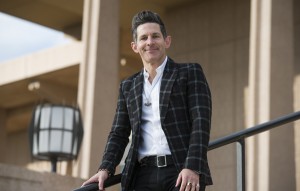CSUN English Professor Martin Pousson Wins NEA Fellowship

English professor Martin Pousson has been awarded the NEA’s 2014 Creative Writing Fellowship in Prose. Photo by Lee Choo.
Martin Pousson’s writings, including his first novel, “No Place, Louisiana,” and his poetry collection, “Sugar,” have been compared to acclaimed writers Dorothy Allison, Frank McCourt and Carson McCullers. They have also caught the attention of the National Endowment for the Arts (NEA).
Pousson, associate professor of English at California State University, Northridge, has been awarded the NEA’s 2014 Creative Writing Fellowship in Prose. The honor, which includes a $25,000 grant through the federal government’s Art Works program, is for a collection of interlocking short stories that chronicle the sexual coming of age of a young mixed-raced man in the bayous of Louisiana.
“The greatest part of the fellowship is not the money, it’s the endorsement of the NEA,” Pousson said. “I’ve been working for a couple of years on a new set of stories, which has been a challenge while teaching full time. I finally have the stories in an arrangement that looks more like a full book. I was thrilled to learn that the NEA sees it that way as well. And even better, so many of my heroes have been recognized by the NEA in the past, including artists Tim Miller and Robert Mapplethorpe and writers Denis Johnson, Jennifer Egan and Michael Cunningham.
“I am really grateful that the NEA still funds literature fellowships,” he said. “It only grants a tiny number each year, and I am honored to receive one of them. Humans are narrative creatures at heart, so it’s great that a federal grant still values story telling. Narrative art intertwines with culture. It can’t be removed to a higher plane or examined from afar. We don’t often think of art and utility together, but story telling enacts both — it reveals people to each other and charges them to think.”
In her email informing Pousson of the award, NEA Acting Literature Director Amy Stolls wrote: “Literature Fellowships continue to be the only NEA grants to individuals open to direct applications, and we are delighted to include you and your work in this proud history. It is our hope that the award is as much encouragement and validation as it is monetary support.”
Elizabeth Say, dean of CSUN’s College of Humanities, said she was proud to count Pousson among the members of her college’s faculty.
“Not only is Professor Pousson a great writer, he is a beloved teacher and mentor, and an excellent citizen of this university,” Say said.
Pousson admitted he missed the initial call from the NEA notifying him of the honor. It had been a grueling 12-hour day that included teaching four classes and meetings with students that took longer than expected. He had plans that evening to celebrate with a former student, Karlee Johnson, who had just won a short story award from Glimmer Train Press, so he decided to ignore the voice mail messages sitting on his cell phone. When he finally checked his messages, he was surprised to discover that one was from Stolls, asking him to call her.
“I had a very restless night,” Pousson said. “When I called in the morning, she delivered the news in a lovely, personal way. Yet even though I could hear her voice, it still seemed like I was not yet awake.
“I had applied as a lark and had scrambled to get my submission in on time,” he said. “That was nearly a year ago, so I put the application out of my mind. I figured nothing was going to happen and moved on. The call was a real surprise.”
The NEA grant will support his latest venture, “Black Sheep Boy,” a collection of short stories that fall into the “fabulism” school of writing. He plans to use the friction that arises between dominant and subordinate cultures, as well as between mainstream realism and fables, to tell the stories of a young homosexual boy in Cajun Louisiana for whom the American dream has gone wrong. In particular, Pousson plans to tap into the ancient myths of loup-garoux, of werewolves, that dominated his childhood in the bayous of Acadiana, La. His protagonist is a half-Cajun, half-Creole boy who tries to bleach his skin and drop his accent in order to rise above the bayou culture that produced him.
“It started as an effort to follow up my first novel but with short stories,” he said. “I initially envisioned the book as an exploration of a phenomenon in the bayous where there are extraordinarily high incidents of both cancer and mental illness, an area of Louisiana that some people call cancer gulch. But as I started writing, the stories shifted to the story of the ‘Black Sheep Boy’ coming of age sexually in a culture that is decaying. The language of his grandparents is dying. People are going mad. There is a sense of loss. And somehow out of that loss, one may get a soul.”
Pousson said writing his new book has been slow, what with the demands of his teaching schedule, but he expects the pace to pick up soon. He’ll be teaching one less class next semester and has applied for a sabbatical next fall so he can finish “Black Sheep Boy.”
“That’s why this grant is so encouraging,” he said. “It gives me hope that I can take the time to really pull the book together and center it in a new way.”

 experience
experience